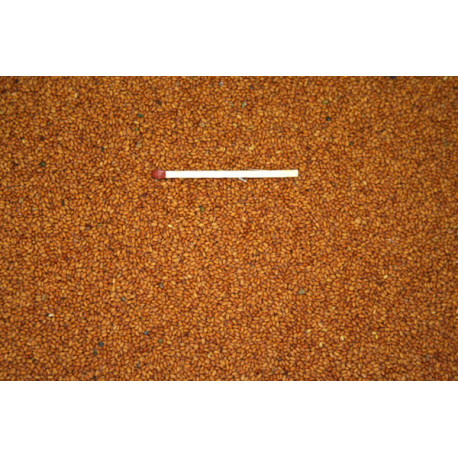- In the process of being restocked




Reference: 169103
Camelina seeds contain vitamins (vitamin E) and minerals (magnesium, zinc) that contribute to the proper functioning of the body and the maintenance of health.
They're rich in omega-3 fatty acids, healthy fats that support heart health, reduce inflammation, and promote healthy brain function.
Camelina seeds contain vitamins (vitamin E) and minerals (magnesium, zinc) that contribute to the proper functioning of the body and the maintenance of health.
They're rich in omega-3 fatty acids, healthy fats that support heart health, reduce inflammation, and promote healthy brain function.
Improves liver and overall health of birds.
Suitable for a wide range of birds, including parrots, canaries, budgerigars, and other exotic birds.
Benefits for birds:
- Liver support.
- Detoxification: Helps eliminate toxins from the liver and improves digestion.
- Strengthening the immune system.
Instructions for use:
Dosage: Add a small amount (usually a teaspoon per day) to the birds' usual seeds. The amount may vary depending on the size and specific needs of the birds. Can be mixed with the birds' daily food.
Precautions:
Store in a cool, dry place, away from moisture and direct sunlight.
Peeled peanuts are very popular treats for parrots.
They are to be distributed sparingly because they are rich.
Ideal food to fill your wild bird dispensers, they will bring the necessary fat to the birds to spend the winter more easily.
The favorite of chickadees and a real treat for many birds.
The sunflower seed contains nearly 40% lipids, but also proteins, carbohydrates, and vitamins B and E. A sunflower seed contains approximately 600 kilocalories per 100 g.
It meets the needs of a wide variety of birds throughout the year, including the smallest among them.
Sunflower seeds are a real treat for our birds who love them!
Clover stimulates the immune system and slows down cellular ageing through its excellent antioxidant properties. Rich in vitamins B, C, E and provitamin A.
Onion seeds are rich in minerals, vitamins, and antioxidants.
Hemp seeds are highly nutritious and contain more essential fatty acids (EFAs) than any other source and are in second place, after soya, for their richness in highly digestible proteins, of high biological value. They are particularly recommended during the breeding seasons in order to stimulate the reproductive instinct of birds.
Buckwheat is a nutritious seed often included in the diet of cage and aviary birds.
- Appearance: Buckwheat is a triangular seed, light brown to greyish in colour, with a slightly rough shell.
Benefits for Birds:
- Balanced Nutrition: Buckwheat offers a combination of proteins, carbohydrates, and fibres, contributing to a balanced diet.
- Energy: The complex carbohydrates provide a sustainable source of energy for the birds' daily activities.
- Digestive System: The fibres promote good digestion and a healthy intestinal regulation.
- Proteins: The proteins in buckwheat support growth, reproduction, and the maintenance of muscle mass in birds.
Radish seeds have antioxidant, detoxifying, draining, and decongestant properties.
Peeled peanuts are treats highly appreciated by parrots.
They should be distributed sparingly as they are rich.
An ideal food to fill your feeders for wild birds, they will provide the necessary fat for birds to get through the winter more easily.
A favourite of tits and a real delicacy for many birds.

Camelina seeds contain vitamins (vitamin E) and minerals (magnesium, zinc) that contribute to the proper functioning of the body and the maintenance of health.
They're rich in omega-3 fatty acids, healthy fats that support heart health, reduce inflammation, and promote healthy brain function.
